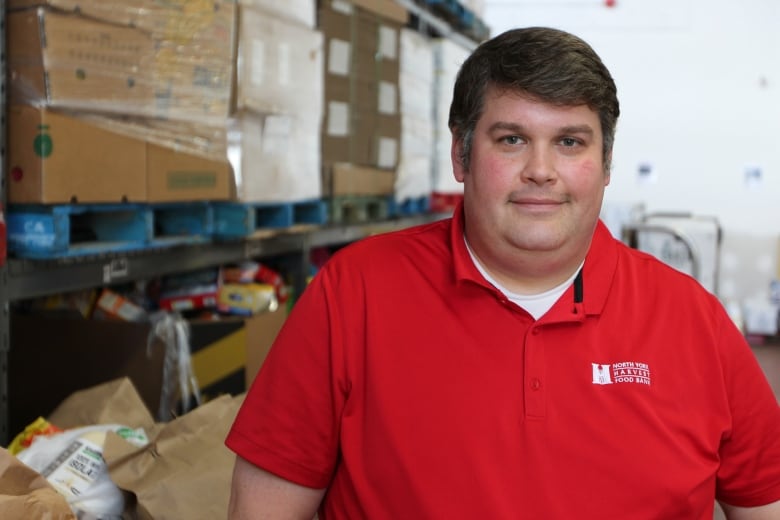‘We are in a crisis’: 1 in 10 Torontonians now rely on a food bank, new report finds
One in 10 people in Toronto are now relying on food banks, twice as many as the year prior, a new report finds.
Food bank usage has smashed another record this year, with more than 2.5 million visits between April 2022 and March 2023 — a 51 per cent increase from the year before — and there are no signs of slowing down, according to this year’s Who’s Hungry report from Daily Bread and North York Harvest food banks.
Daily Bread and North York Harvest indicate in the report they are anticipating Toronto food bank visits in 2023 will surpass three million visits.
“We are in a crisis as a city,” Ryan Noble, executive director of North York Harvest Food Bank, told CBC Toronto. “We’re in real danger as a community, when we have one in 10 of our residents needing to turn to food banks.”

He said many food banks that North York Harvest and Daily Bread Food Bank distribute food to are a loose network of volunteers and people who are trying to do their best to respond, but a 50 per cent increase isn’t a pace they can sustain.
The report lays out a roadmap for politicians at all levels of government to follow to break the troubling trend of growing food bank use, central among them, asking governments to improve social assistance programs and rates and invest in affordable housing.
Social assistance funding not enough
Brigitte Martin knows the difference adequate government assistance funding makes firsthand.
She was among the one in 10 Torontonians using a food bank reflected in the 2023 report. Martin relied on the Ontario Disability Support Program until August 2023, when she turned 65 and began to receive her Old Age Security pension, along with Canada Pension Plan earnings and a small pension from early-career employment in Germany.

After a workplace injury more than a decade ago left her unable to work, she had less than $700 a month from ODSP funding for food, medical needs, clothes and incidentals, forcing her to reply on Toronto food banks.
Martin, a savvy saver, can tell you how much most grocery store items increased by in the last year or two compared to pre-pandemic levels.
Thompson said the province is building 1.5 million homes by 2031 through its Housing Supply Action Plans and will keep looking for ways to build more houses and rental units to address the “supply crisis.”
Hetherington said it will take more than this.
“Given the provincial government’s initiatives and the fact that we have seen a four-fold increase at food banks over the past four years, we believe it is time for the government to revisit its strategy on poverty reduction and food insecurity,” he said.
City says it is working to get affordable housing built
The city is being asked to increase funding for poverty reduction programs, increase housing affordability funding and make it easier to get housing built.
Arianne Robinson, a spokesperson for Mayor Olivia Chow’s office told CBC News in a statement that the city is kicking in $6.67 million for the Canada Ontario Housing Benefit, normally funded by the provincial and federal governments.

She said under Chow’s leadership, council put $10 million into the Multi-Unit Residential Acquisition Program, an affordable rental program for not-for-profit housing providers, and Chow is hoping to boost the program further.
She said council just approved the mayor’s new housing plan, which encourages coordination of all city divisions.
“The goal is more affordable non-profit, public and private sector housing, faster,” she said.
Hetherington told CBC Toronto, “I’m a hopeful guy without hope in this report.”
However, he says, prompt policy solutions from elected representatives can stop this trend.
“I gave myself $40 on groceries a week,” she said. “Food prices and rent prices are far too high … within those times it was $80 or more and I still had to make do.”
The weeks she faced health challenges or other unexpected expenses like a broken computer were even harder to get through, she said.
Martin said she wishes more elected representatives could see the “tremendous weight” on the shoulders of those turning to food banks and work to create change.
Food banks demand action from governments
The Who’s Hungry report makes clear asks of three levels of government to try and change the tide.
Neil Hetherington, CEO of Daily Bread Food Bank, told CBC Toronto every elected representative in the city is being mailed a copy of the report.
He said he hopes his phone is ringing off the hook on Tuesday with politicians trying to fix what he refers to as a crisis.

“Food bank usage is a symptom of policy failures,” he said. “It is clear that there are multiple failures by all levels of government who have the opportunity to read the report and change.”
The report includes a laundry list of asks, but top of Hetherington’s list is for governments to build more affordable housing faster than they are currently, and act with haste to fund and deliver the Canada Disability Benefit.
The federal government did not respond to CBC’s requests by deadline.
A spokesperson for Ontario’s Ministry of Children, Community and Social Services, Ryan Thompson, highlighted that Ontario already increased ODSP rates and tied future increases to inflation.
Thompson said in a statement the government invested $96 million through the Ontario Trillium Foundation’s Resilient Communities Fund, which provides grants to help non-profit organizations like food banks. He said it also increased funding to the Student Nutrition Program and First Nations Student Nutrition Program by $6.1 million this year.









Redes Sociais - Comentários